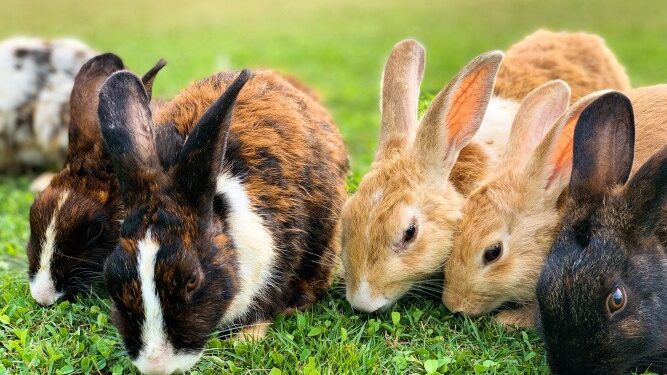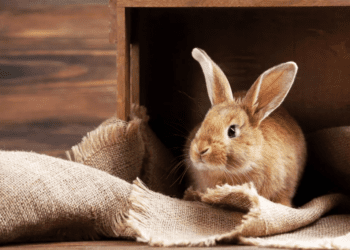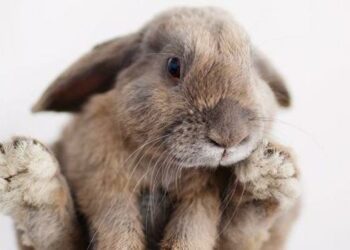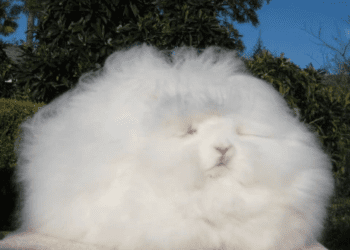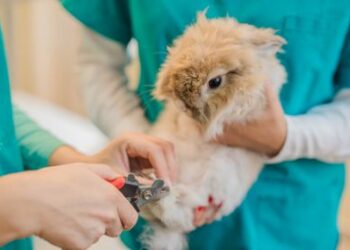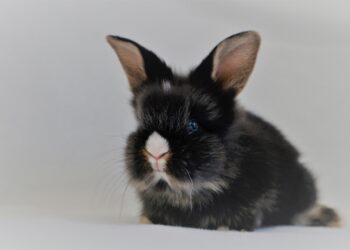Calcium is one of the most vital minerals for almost all creatures. For the rodents like rabbits, calcium provides bone strength and keeps the teeth strong. But not too much of anything good is beneficial, and to prove this point, we would discuss why you should keep a check on the quantity of calcium in the diet of your pet rabbit.
Contents
What happens when a rabbit has too much calcium?
Calcium is, as described above, one of the most important nutrients for rabbits. It helps in the proper growth of skeletal structure. But too high an amount of calcium in the diet of the rabbit will cause it some difficulties. Bladder sludge is an issue faced by pet rabbits when they eat too much amount of calcium. Along with that, they can also get affected by kidney stones and urinary tract infections.
All these complications take place when the rabbit gets too high a dose of calcium and that extra calcium which is not required for their daily physical activity gets stored in the kidney and bladder, causing these ailments.

How do you treat the high calcium in the rabbits?
There are several supplements that are often used by pet owners without taking the vet’s suggestion. The feeding of such supplements for a long time would result in difficulties for the rabbit.
However, when the vet suggests that the calcium intake is high in the rabbit’s diet, you should decrease the number of supplements and add some more hay to the daily diet. Hay or grass does not contain any calcium so it will fill the tummy of the pet rodent and yet the rabbit would not have to consume much calcium.
How can you decrease the amount of calcium in the body of rabbits?
Do not give the rabbit much dry food. The commercialized dry pellets often contain a good amount of calcium as this one is counted as one of the healthy and beneficial nutrients for the rabbits. If you are not able to replace the dry food with some hay and grass regularly then switch to the dry food brand to something that contains a much lower amount of calcium in their pellets.
Opting for a fresh hay and grass diet along with some vegetables or fruits that are low in calcium and an adequate amount of freshwater would be the right choice for the rabbits that are suffering from a high intake of calcium.
What causes too much calcium in bunnies?
When the diet of the rabbit is not high in calcium and yet it is suffering from the excess of calcium then there can be other complications that lead to this situation. Liver failure can be one such problem which indicates that the rabbit is having excess calcium in its’ body. Also, the female rabbits suffer from excess calcium as they proceed towards their pregnancy period. In the last few weeks, their calcium level increased.
Which foods for rabbits are low in calcium?
If you can feed the rabbit vegetables like bok choy, celery, collard greens, corn, and dandelion greens then it would automatically decrease the calcium intake in their body. These vegetables can be fed to the rabbit which is suffering from excess calcium and that will surely work if you feed it less amount of pellet along with these ones. The diet should be followed for at least a month to see any change in the health standard of the pet rabbit.
Why vegetables are more helpful than pellets to reduce calcium in rabbits?
Vegetables usually contain a good amount of water which in turn will make the rabbit lose the calcium faster. Pellets or other dry food do not contain water so it will not fill the stomach of the rabbits as much as the vegetables.
The water portion of the vegetables will also help your rabbit to stay hydrated and their body mass will also not increase. The obesity issue can be managed as well as calcium intake will lessen if you feed the rabbits more vegetables than pellets or dry food.
You should also not bother about giving a few vegetables daily as that will not be attractive to the rabbits. But mixing the vegetables to make a colorful and variant platter will be much more interesting to the rabbit and they will lovingly eat that.
How do water intakes influence the reduction of calcium in rabbits?
When it comes to mending the liver and kidney, water has a very important role to play. The bladder sludge is connected with calcium deposition as well as urinary tract issues, both related to the water intake and the outcome.
The calcium sludge of the rabbits often suggests that the creature has taken too much calcium and too less water. If the situation is not taken seriously then it would be cystitis which means it will have cysts on its body. It can even lead to urolithiasis and that will be lethal and painful for the creature.
When the water intake of the rabbit will be adequate the urine of the pet will flush out this excess calcium and the bladder will become empty of all the sludge that may gather there. The water intake of the rabbit does not increase dramatically so you may add some vegetables which are high in water quotient. The greens also should be sprinkled with water so the water intake increases.
The water needs to be present always near the rabbits; it can be in a bowl that is rabbit-friendly, tilt-proof, and heavy at the bottom. The bowl may not be very deep so the rabbit does not fall inside it. The owner needs to replace the water of the bowl once or twice a day if it is left unused as the water may get dirty.
Can the tap water increase calcium deposition in the rabbit?
Calcium is found in the drinking water too. It depends upon the water source of the individual area. There is a soft and hard type of water and hard water contains more calcium than soft water. When your area gets hard water on tap and you provide this water to your rabbit, then it may intake a small amount of calcium from its share of drinking water.
If your vet suggests the rabbit to not have calcium at all for some days then you may turn to boiled water or source soft water from elsewhere. Hard water contains calcium which will add up to the calcium deposition of the pet rabbit.
However, the areas where there is the availability of soft water would not have this problem. But if your rabbit is detected with calcium deposition you may check the water source to know if it is hard water or soft water.
Can exercise make the rabbit lose calcium?
Exercising is a part of the rabbit’s daily routine. Rabbits do not make much sound or for that matter, they are not noisy kind of creatures. But they are quite active throughout the day. This active lifestyle helps them to get rid of the excess calcium from their body. The calcium usually gets washed out by means of urination.
How will you detect urinary tract infections in rabbits due to excessive calcium?
There are various symptoms that will detect that the rabbit is suffering from a urinary tract infection. This happens when kidney stones are formed and thus the flow of urine gets hampered. Multiple stones are formed due to the excess amount of calcium in the urine of the rabbit.
The symptoms like blood in the urine, the mark of urine on the perineum, irritation during urination, different colored urine like brown or beige, and difficulty in walking or hunching posture may be deducted as the symptom of urinary tract infection.
The excess calcium deposition is caused by the consumption of too much commercial food and lack of water intake. The absorption of calcium and release of the same in the urine cause all these issues. When the rabbit is not doing exercise and living a sedentary lifestyle, the risk of getting affected by the stone in the bladder increases.
How obesity can lead to calcium deposition in rabbits?
Obesity among rabbits is a crucial problem. We have earlier mentioned that rabbits are by nature quite active, but when they are not given ample space to move and roam, they gradually become lazier and lazier. They lose the habit of exercising and being active. Thus they gain weight and that leads to many severe problems, calcium deposition is one of these.
So when the rabbit is detected with excess calcium deposition and is suffering from lethargy, lack of appetite along with other urinary tract issues, it needs to be taken for exercise. You can just let it run on the backyard or balcony whenever possible, minding the weather though. The harsh sun is not suitable for the exercise of the rabbits so they can be taken out in fresh air only when it is afternoon or early in the morning.
A good amount of exercise, adequate water intake, and the addition of fresh grass, hay, and vegetable will surely help the bunny to recover from the excess calcium deposition and its calcium level will reduce.
More:


